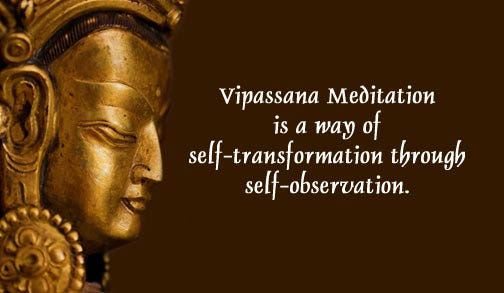Buddha Vipassana Meditation, also known as insight meditation, is a practice that originated in ancient India and has been passed down through the teachings of the Buddha. It is a form of meditation that focuses on developing mindfulness and insight into the true nature of reality. The word “Vipassana” means “insight” or “clear seeing,” and the practice involves observing the mind and body with non-judgmental awareness.
In Buddha Vipassana Meditation, practitioners are encouraged to cultivate a deep understanding of the impermanent and ever-changing nature of existence. By observing the sensations in the body, thoughts, and emotions without attachment or aversion, one can develop insight into the true nature of reality and gain liberation from suffering.
Contents
- 1 The History and Origins of Vipassana Meditation
- 2 The Science of Meditation: How It Affects the Brain
- 3 The Benefits of Vipassana Meditation for Mental Health
- 4 The Role of Mindfulness in Vipassana Meditation
- 5 The Connection Between Vipassana Meditation and Emotional Regulation
- 6 The Physical Benefits of Vipassana Meditation
- 7 The Effect of Vipassana Meditation on the Nervous System
- 8 The Relationship Between Vipassana Meditation and Pain Management
- 9 The Impact of Vipassana Meditation on Sleep Quality
- 10 FAQs
- 10.1 What is Buddha Vipassana Meditation?
- 10.2 How does Buddha Vipassana Meditation change the brain?
- 10.3 What are the benefits of Buddha Vipassana Meditation?
- 10.4 How does Buddha Vipassana Meditation change the body?
- 10.5 How long does it take to see the benefits of Buddha Vipassana Meditation?
- 10.6 Is Buddha Vipassana Meditation a religious practice?
Key Takeaways
- Buddha Vipassana Meditation is a mindfulness practice that originated in ancient India and has been passed down through generations.
- Scientific studies have shown that regular meditation can change the structure and function of the brain, leading to improved mental health and emotional regulation.
- Vipassana Meditation can also have physical benefits, such as reducing inflammation and improving sleep quality.
- Joseph Goldstein, a prominent teacher of Vipassana Meditation, emphasizes the importance of cultivating a non-judgmental awareness of one’s thoughts and emotions.
- Overall, practicing Buddha Vipassana Meditation can lead to a more balanced and peaceful state of mind, as well as improved physical health.
The History and Origins of Vipassana Meditation
Vipassana Meditation has its roots in Buddhism, specifically in the Theravada tradition. It is believed to have been taught by the Buddha himself over 2,500 years ago as a means to attain enlightenment. The practice was passed down through generations of Buddhist monks and nuns, preserved in ancient texts such as the Satipatthana Sutta.
In recent times, Vipassana Meditation gained popularity in the West largely due to the efforts of Joseph Goldstein, an American meditation teacher and author. Goldstein co-founded the Insight Meditation Society (IMS) in Massachusetts, which became a prominent center for Vipassana Meditation practice. Through his teachings and writings, Goldstein introduced Vipassana Meditation to a wider audience and helped establish it as a valuable tool for personal growth and self-discovery.
The Science of Meditation: How It Affects the Brain
Scientific research has shown that meditation has a profound impact on the brain. Regular meditation practice has been found to increase gray matter density in areas associated with attention, emotional regulation, and self-awareness. It also strengthens the connections between different regions of the brain, enhancing overall cognitive function.
One of the key mechanisms through which meditation affects the brain is neuroplasticity. Neuroplasticity refers to the brain’s ability to reorganize and adapt in response to experiences and environmental changes. Through consistent meditation practice, individuals can reshape their neural pathways, leading to lasting changes in behavior, emotions, and cognition.
The Benefits of Vipassana Meditation for Mental Health
| Benefit | Description |
| Reduced Stress | Vipassana meditation has been shown to reduce stress levels and improve overall mental well-being. |
| Improved Focus | Regular practice of Vipassana meditation can improve focus and concentration, leading to increased productivity and better decision-making. |
| Increased Self-Awareness | Vipassana meditation helps individuals become more aware of their thoughts, emotions, and behaviors, leading to greater self-understanding and personal growth. |
| Better Emotional Regulation | Through Vipassana meditation, individuals can learn to regulate their emotions and respond to challenging situations in a more calm and balanced way. |
| Improved Sleep | Regular practice of Vipassana meditation has been shown to improve sleep quality and reduce insomnia. |
Vipassana Meditation has been found to have numerous benefits for mental health. Studies have shown that regular practice can reduce symptoms of anxiety and depression by promoting a sense of calm and equanimity. By cultivating mindfulness and non-reactivity, individuals become better equipped to handle stressful situations and navigate challenging emotions.
Furthermore, Vipassana Meditation has been found to be effective in stress reduction. The practice encourages individuals to observe their thoughts and emotions without judgment, allowing them to develop a greater sense of perspective and detachment. This shift in perspective can help individuals break free from the cycle of stress and find inner peace.

The Role of Mindfulness in Vipassana Meditation
Mindfulness is a fundamental aspect of Vipassana Meditation. It involves paying attention to the present moment with non-judgmental awareness. By cultivating mindfulness, individuals become more attuned to their thoughts, emotions, and bodily sensations, allowing them to develop a deeper understanding of their inner experiences.
In Vipassana Meditation, mindfulness serves as a tool for developing insight into the impermanent nature of reality. By observing the ever-changing nature of sensations in the body and thoughts in the mind, practitioners gain a direct experience of the transient nature of existence. This insight can lead to a profound shift in perception and a greater sense of freedom from attachment and suffering.
The Connection Between Vipassana Meditation and Emotional Regulation
Vipassana Meditation has been found to have a significant impact on emotional regulation. By cultivating mindfulness and non-reactivity, individuals develop the ability to observe their emotions without getting caught up in them. This allows for a greater sense of emotional stability and resilience.
Moreover, Vipassana Meditation helps cultivate compassion and empathy towards oneself and others. Through the practice of observing the mind and body with non-judgmental awareness, individuals develop a deep understanding of the interconnectedness of all beings. This understanding fosters a sense of compassion and kindness, leading to improved relationships and a greater sense of well-being.
The Physical Benefits of Vipassana Meditation
In addition to its mental health benefits, Vipassana Meditation has been found to have positive effects on physical health. Regular practice has been associated with reduced blood pressure, improved immune function, and enhanced cardiovascular health. The deep relaxation and stress reduction achieved through meditation contribute to these physical benefits.
Furthermore, Vipassana Meditation has been found to be effective in pain management. By developing mindfulness and non-reactivity towards bodily sensations, individuals can reduce their perception of pain and improve their ability to cope with chronic pain conditions.
The Effect of Vipassana Meditation on the Nervous System
Vipassana Meditation has a profound impact on the nervous system. Research has shown that regular practice can regulate the autonomic nervous system, which controls involuntary bodily functions such as heart rate, digestion, and breathing. By cultivating mindfulness and relaxation through meditation, individuals can activate the parasympathetic nervous system, which promotes rest and relaxation.
Moreover, Vipassana Meditation has been found to reduce the activity of the amygdala, a part of the brain responsible for processing fear and stress responses. By calming the amygdala, individuals can experience a greater sense of calm and emotional stability.
The Relationship Between Vipassana Meditation and Pain Management
Vipassana Meditation has been found to be effective in managing pain. By developing mindfulness and non-reactivity towards bodily sensations, individuals can reduce their perception of pain and improve their ability to cope with chronic pain conditions.
Research has shown that regular meditation practice can increase pain tolerance and reduce the intensity of pain experienced. By observing the sensations associated with pain without judgment or resistance, individuals can develop a greater sense of acceptance and equanimity towards their pain, leading to improved pain management.
The Impact of Vipassana Meditation on Sleep Quality

Vipassana Meditation has been found to have a positive impact on sleep quality. Regular practice helps individuals develop relaxation skills and cultivate a sense of calm before bedtime. By practicing mindfulness and letting go of racing thoughts, individuals can improve their sleep hygiene and promote better sleep.
Furthermore, Vipassana Meditation can help individuals manage insomnia and other sleep disorders. By developing a greater sense of awareness and acceptance towards sleep difficulties, individuals can reduce anxiety and stress associated with sleep disturbances, leading to improved sleep quality.
In conclusion, Vipassana Meditation offers a wide range of benefits for mental and physical health. Through the cultivation of mindfulness, individuals can develop insight into the true nature of reality and gain liberation from suffering. The practice has been found to have profound effects on the brain, promoting neuroplasticity and enhancing cognitive function.
Vipassana Meditation has been shown to have positive impacts on mental health, including reducing symptoms of anxiety and depression, as well as improving stress management. The practice also fosters emotional regulation and compassion towards oneself and others.
Furthermore, Vipassana Meditation has physical benefits such as reducing blood pressure, improving immune function, and aiding in pain management. It also has a significant impact on the nervous system, regulating autonomic functions and reducing stress responses.
Overall, Vipassana Meditation is a powerful practice that can transform one’s life by promoting mindfulness, insight, and well-being. It is an invitation to explore the depths of one’s mind and experience the profound peace and liberation that comes from understanding the true nature of reality.
FAQs
What is Buddha Vipassana Meditation?
Buddha Vipassana Meditation is a form of mindfulness meditation that originated in ancient India. It involves focusing on the breath and observing thoughts and sensations without judgment.
How does Buddha Vipassana Meditation change the brain?
Buddha Vipassana Meditation has been shown to increase gray matter in areas of the brain associated with attention, emotional regulation, and self-awareness. It also decreases activity in the default mode network, which is responsible for mind-wandering and self-referential thinking.
What are the benefits of Buddha Vipassana Meditation?
Buddha Vipassana Meditation has been shown to reduce stress, anxiety, and depression. It can also improve attention, emotional regulation, and overall well-being.
How does Buddha Vipassana Meditation change the body?
Buddha Vipassana Meditation has been shown to reduce inflammation and improve immune function. It can also lower blood pressure and improve heart health.
How long does it take to see the benefits of Buddha Vipassana Meditation?
The benefits of Buddha Vipassana Meditation can be seen after just a few weeks of regular practice. However, the longer and more consistent the practice, the greater the benefits.
Is Buddha Vipassana Meditation a religious practice?
Buddha Vipassana Meditation has its roots in Buddhism, but it is not a religious practice. It can be practiced by people of any faith or no faith at all.
To read more about Buddha Vipassana Meditation
To read about The Difference Between Religion and Spirituality











